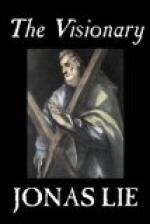In the lonely stillness of the church a panic came over me, an inexpressible terror of unseen powers, and I fled precipitately.
When I got outside, I discovered that I had lost Susanna’s blue cross. It could only be in the church on the step where I had been sitting. At that moment, while my heart was still throbbing with terror, I would not have gone back again into the church for anything in the world—except Susanna’s blue cross. I found it, when I carefully searched the floor where I had been sitting.
The second time during these years that my nervous system gave evidence of its unsoundness was late in the autumn, a month or two before I was to go home.
A peasant, who had gone in to see the minister, had fastened his horse, which was wall-eyed, to the churchyard wall. I began to look at it; and the recollection of its dead, expressionless glance followed me for the rest of the day. It seemed to me as if its eyes, instead of looking out, looked inwards into a world invisible to me, and as if it would be quite natural if it forgot to obey the reins, and left the ordinary highway for the road to Hades, along which the dead are travelling.
With this in my mind, I sat that afternoon in the parsonage where people were talking of all kinds of things, and there suddenly appeared before me a home face, pale and with a strained look, and soon after I could see that the man to whom it belonged was striving desperately to climb up from the raging surf on to a rock. It was no other than our man Anders. He fixed his dull, glassy eyes upon me as he struggled, apparently hindered from saving himself by something down at his feet, which I could not see. He looked as if he wanted to tell me something. The vision only lasted a moment; but a torturing almost unbearable feeling, that in the same moment some misfortune was befalling us at home, drove me from the room to wander restlessly in the fields for the rest of the day.
When I came back they asked me what had been the matter, that I had so suddenly turned deadly pale and hurried from the room.
A fortnight later there came a sad letter from home. My father’s yacht, the Hope, which, after the custom of those days, was not insured, and was loaded for the most part with fish, which my father had bought at his own cost, had been wrecked on the way from Bergen in a storm on Stadt Sea. The ship had sprung a leak, and late in the afternoon had to be run ashore. The crew had escaped with their lives, but our man Anders had had both legs broken.
This shipwreck gave the first decided blow to my father’s fortune. The second was to come towards the end of the following year, in the loss of another yacht, the Unity; and the third blow, with more important results, was struck when it was at last decided by Government that our trading station was not to be a stopping-place for steamers.




